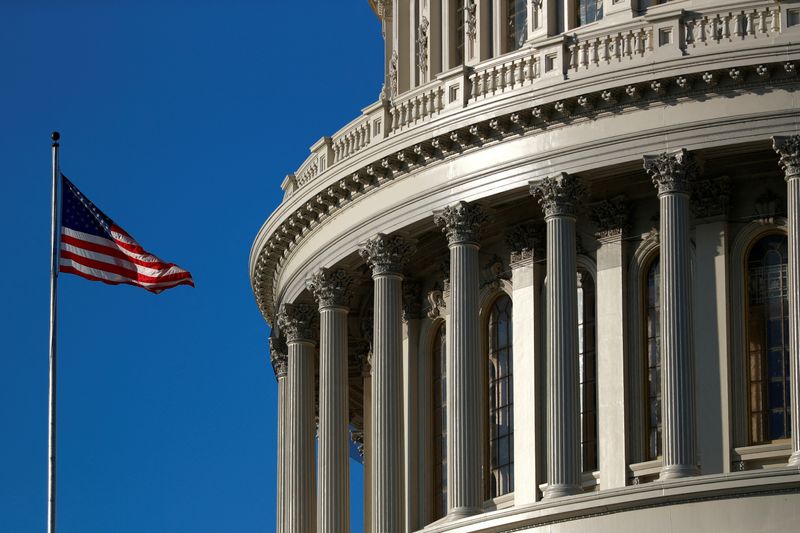(This Oct. 10 story has been corrected to fix name of Bipartisan Policy Center in last paragraph)
By Richard Cowan and David Morgan
WASHINGTON (Reuters) - If Republicans win control of the U.S. House of Representatives in November's midterm elections, they expect to use a powerful and potentially dangerous tool as leverage in their dealings with Democratic President Joe Biden: The federal debt ceiling.
The U.S. Treasury is expected to reach its mandated $31.4 trillion borrowing limit in 2023, and Republicans ranging from hard-line conservatives to moderates see that as an opportunity to curb Biden's spending on Democratic initiatives such as climate change and new social programs.
"It's critical that we're prepared to use the leverage we have," said Representative Scott Perry, chairman of the hard-line House Freedom Caucus, which could see greater influence if Republicans win control in the Nov. 8 election, as nonpartisan election forecasters say is likely.
Representative Buddy Carter, a contender for House Budget Committee chairman, said the debt ceiling would be key to a new Republican majority's hopes of reining in federal spending.
"Getting people's attention about our debt is very difficult. The debt ceiling is going to be an important tool," Carter told Reuters.
Congress created the debt ceiling in 1917 to give the government greater borrowing flexibility, and must approve each increase to ensure that the United States meets its debt obligations and avoids a catastrophic default.
The system, in theory, is meant to control the rise in the nation's debt, but has not been an effective tool in recent decades. Washington's debt swelled from $3.2 trillion in 1990 to $31.1 trillion today.
But the approach has set the stage for regular flashpoints, with Republicans regularly threatening to block an increase to exact concessions.
One such effort in 2011 led to a budget-cutting agreement. But others failed to defund the Affordable Care Act in 2013 or complete construction of a wall along the U.S.-Mexico border during Donald Trump's administration.
There have also been harrowing consequences. The protracted 2011 standoff in Congress prompted Standard & Poor's to downgrade the U.S. credit rating for the first time, sending financial markets reeling.
The risks are arguably higher now, as global economies flirt with post-pandemic recessions and a looming European energy crisis.
Republicans approved additional spending during former President Trump's years in power, but following Biden's election returned to their focus on the deficit.
Republican Senator Bill Cassidy, a moderate, told Reuters that the debt ceiling would allow Republicans to "take the credit card away" from Biden.
Democrats say they have no illusions about what could lie ahead.
"I not only have fears if the Republicans ... take over the House, I have nightmares," said Democratic Representative James McGovern. "I try not to think about it," he said referring to a possible debt limit battle.
'EXTENDED DEBATE'
Debate about the debt ceiling could flare again early next year, after the new Congress is sworn in.
Sometime in the first quarter of 2023 the nation's line of credit is likely to be exhausted, said Shai Akabas, director of economic policy at the Bipartisan Policy Center.
The Treasury Department can take "extraordinary" steps to stave-off a default until the summer or even longer, depending on revenues and the economy.
"There is likely to be an extended debate" on the debt limit next year no matter who wins the midterms, said Akabas, who has seen several such battles waged. However, with a Republican-controlled House, "That perhaps makes negotiations a bit tougher," he added.
The last standoff came in December 2021, when Congress raised the limit to its current $31.4 trillion only after a bitter fight in which Republicans protested Biden's domestic spending agenda.
Senate Republican leader Mitch McConnell, who vowed to avoid default, finally cut a deal allowing an increase and has since faced blowback from hardliners including former President Trump, who claims he knuckled under to Democrats.
"He is their lapdog! He didn't stop trillions of dollars in spending by refusing to use the debt ceiling as a negotiating tool," Trump said just last month.
McConnell avoided answering a question about the 2023 debt limit debate, saying: "We haven't even finished 2022 yet."
Some lawmakers want to free the country from chronic whiplash over borrowing by overhauling the process. Among the ideas are a new, multi-step plan for Congress and the president acting in tandem, while fostering debate on debt-reduction.
Senator Tim Kaine and fellow Democrat Jeff Merkley "shopped around" a bill last year that would allow the president to raise the limit while giving Congress an opportunity to overrule it.

A bipartisan bill has also been floated in the House.
"It's likely we will be on another collision course unless there is a dynamic shift, or Congress implements a change," predicted Akabas, whose Bipartisan Policy Center has been trying to coax reform out of Congress.